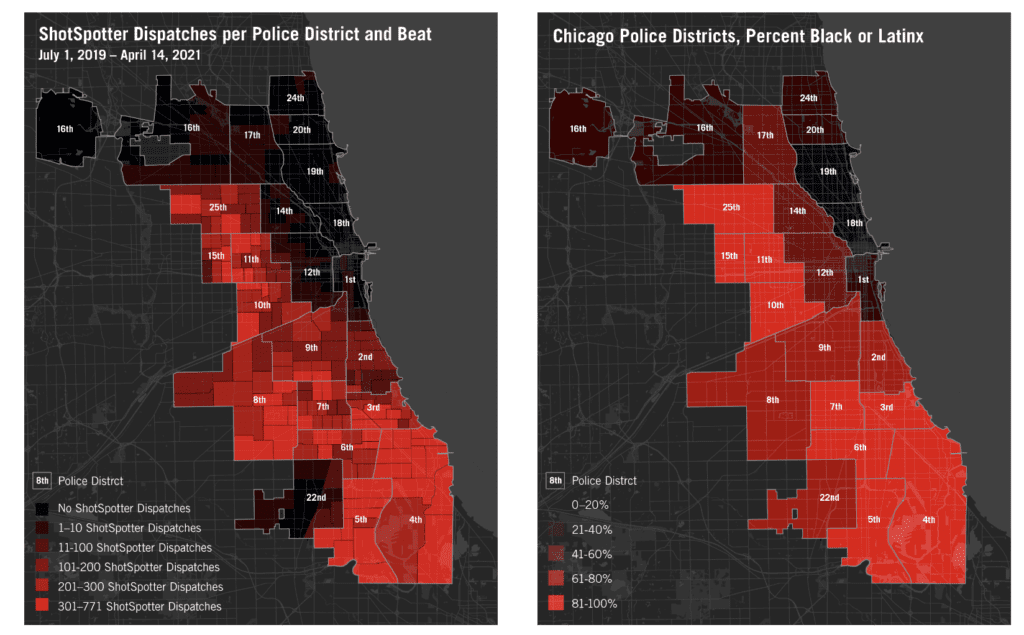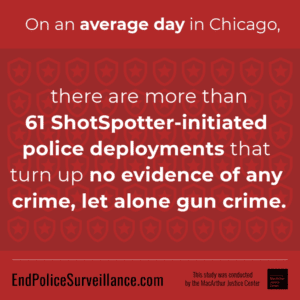The Chicago Police Department’s use of untrustworthy data from ShotSpotter, a surveillance technology placed in predominantly Black and Hispanic communities in the South and West sides of Chicago, led to multiple instances of wrongful detainment and unfounded charges. The MacArthur Justice Center’s class action lawsuit takes the City of Chicago to task for its continued usage of a technology that garners discriminatory policing practices through reporting data that, by the city’s own Office of Inspector General’s assessment, is sorely and dangerously inaccurate.
Despite ShotSpotter’s claims of 97% accuracy, a MacArthur Justice Center (MJC) study using data from the Chicago Police Department (CPD) revealed that over the course of 21 months, 89% of ShotSpotter deployments turned up no gun-related crime and 86% led to no report of any crime at all. The study’s findings were further confirmed by the City of Chicago’s Office of Inspector General (OIG), which conducted its own study and found that ShotSpotter generates tens of thousands of unjustified CPD deployments each year.

ShotSpotter’s so-called “accuracy” percentage is based on a system in which an alert is only marked inaccurate if police happen to file a voluntary complaint. But Chicago police seldom file a voluntary complaint after chasing down a false alert. In fact, ShotSpotter has never been tested to see whether it can reliably tell the difference between gunshots or other loud noises, such as firecrackers, backfiring cars, construction noises, and helicopters. The technology also often inaccurately pinpoints the source of the noise by large distances, sending police to the wrong location.
The City of Chicago only deploys ShotSpotter across the South and West sides of Chicago, blanketing ShotSpotter sensors over the twelve police districts with the highest proportion of Black and Latinx residents and the lowest proportion of White residents. 80% of Black Chicagoans and 65% of Latinx Chicagoans live under ShotSpotter’s shadow, compared to only 30% of White Chicagoans. Unfounded ShotSpotter deployments amounted to more than one in twelve of the top-priority police dispatches in the South and West Side police districts where ShotSpotter is active.
“Only residents in predominantly Black and Latinx neighborhoods have to contend with the burden of thousands of unnecessary and potentially dangerous police deployments. Only their neighborhoods get saddled with inflated statistics about supposed gunfire. At the same time, there is no evidence that the ShotSpotter system makes communities safer or reduces crime.”
MJC filed an amicus brief on behalf of community organizations Brighton Park Neighborhood Council, Lucy Parsons Labs, and Organized Communities Against Deportations, outlining its study’s findings in support of a motion by the Cook County Public Defender that challenged the scientific validity of the ShotSpotter system’s gunfire reports, which prosecutors have attempted to use as evidence in a criminal prosecution.
MJC then filed a class action lawsuit against the City of Chicago, asserting that over a six-month period, CPD reported using physical force on at least 82 Chicagoans, nearly all unarmed Black or Latinx men, during ShotSpotter-prompted deployments. The lawsuit specifically cites several egregious instances of false imprisonment by CPD based on ShotSpotter data, including Michael Williams, who was 63 years old when he spent nearly a year in jail after CPD officers falsely accused him of murder based on an unreliable ShotSpotter alert.
Another named plaintiff cited in the lawsuit is Dennis Ortiz, who was doing his children’s laundry when he was illegally stopped, frisked, handcuffed, interrogated, and ultimately arrested outside of the laundromat following an unfounded ShotSpotter alert. He spent a night in jail before the charges were dismissed.
Derick Scruggs, a 30-year-old father and the final named plaintiff in the lawsuit, was in the parking lot of his job when he was illegally detained, questioned, and searched by police officers who were responding to a ShotSpotter alert. Mr. Scruggs’s lengthy detention involved a degrading and humiliating body search even though there was no evidence he was involved in a shooting. A CDP supervisor later ordered his release, but the investigation continued until the State’s Attorney’s Office dismissed subsequent charges.
 Chicago has committed $9 million a year to pay ShotSpotter for the system and it spends countless additional resources to support thousands of hours of CPD officers chasing down largely unfounded alerts. In 2018, the City of Chicago entered a $33 million, non-competitive, three-year contract with ShotSpotter. Despite damning data and growing public concern, the City secretly extended the contract for two more years through August 2023 without any public notice or input and recently increased the contract’s total value by nearly $6 million. The City of Chicago is one of ShotSpotter’s two largest customers, accounting for 18% of its annual revenue in 2020.
Chicago has committed $9 million a year to pay ShotSpotter for the system and it spends countless additional resources to support thousands of hours of CPD officers chasing down largely unfounded alerts. In 2018, the City of Chicago entered a $33 million, non-competitive, three-year contract with ShotSpotter. Despite damning data and growing public concern, the City secretly extended the contract for two more years through August 2023 without any public notice or input and recently increased the contract’s total value by nearly $6 million. The City of Chicago is one of ShotSpotter’s two largest customers, accounting for 18% of its annual revenue in 2020.
For more about the study and its findings, visit EndPoliceSurveillance.com.
Commonwealth of Massachusetts Appeals Court
In the News
-
Progressives press Chicago mayor over pledge to end controversial policing tool
The Guardian September 16, 2023 -
Despite promise not to, Chicago’s Mayor extends ShotSpotter contract for more than $10M
CBS News Chicago June 15, 2023 -
East Cleveland police chief says ShotSpotter proved its worth in first week, but critics remain skeptical
Cleveland.com March 30, 2023 -
Gunshot detection tech deployed across US, but is it helping?
NewsNation March 3, 2023 -
Portland to change course, accept competitive bids for gunshot detection pilot
Oregon Public Broadcasting January 9, 2023 -
Automated gunshot detection is coming to Fayetteville. The community is split on whether it’s the right fit for the city.
Carolina Public Press December 15, 2022 -
Detroit extends contract with controversial gunshot surveillance firm
The Guardian October 11, 2022 -
Lawsuit Alleges Chicago Police Made False Arrests Based on Faulty ShotSpotter Alerts
WTTW July 21, 2022
For media inquires please contact:
(NOTE: This mailbox is for media inquiries only. All other inquiries, including legal and representation questions, should be submitted through our Contact Form.)
